2019年黑龙江省高考英语试题与答案
2019年全国卷Ⅲ高考英语试题文档版(附答案)【精品版】

绝密★启用前2019年普通高等学校招生全国统一考试(全国卷III)英语注意事项:1.答卷前,考生务必将自己的姓名、准考证号填写在答题卡上。
2.回答选择题时,选出每小题答案后,用铅笔把答题卡上对应题目的答案标号涂黑。
如需改动,用橡皮擦干净后,再选涂其他答案标号。
回答非选择题时,将答案写在答题卡上,写在本试卷上无效。
3.考试结束后,将本试卷和答题卡一并交回。
第一部分听力(共两节,满分30分)做题时,先将答案标在试卷上。
录音内容结束后,你将有两分钟的时间将试卷上的答案转涂到答题卡上。
第一节(共5小题;每小题1.5分,满分7.5分)听下面5段对话。
每段对话后有一个小题,从题中所给的A、B、C三个选项中选出最佳选项。
听完每段对话后,你都有10秒钟的时间来回答有关小题和阅读下一小题。
每段对话仅读一遍。
例:How much is the shirt?A. £19.15.B. £9.18.C. £9.15.答案是C。
第一节(共5小题;每小题1.5分,满分7.5分)听下面5段对话。
每段对话后有一个小题,从题中所给的A、B、C三个选项中选出最佳选项。
听完每段对话后,你都有10秒钟的时间来回答有关小题和阅读下一小题。
每段对话仅读一遍。
例:How much is the shirt?A. £19.15.B. £9.18.C. £9.15.答案是C。
1. Where does the conversation probably take place?A. In a library.B. In a bookstore.C. In a classroom.2. How does the woman feel now?A. Relaxed.B. Excited.C. Tired.3. How much will the man pay?A. $520.B. $80.C. $100.4. What does the man tell Jane to do?A. Postpone his appointment.B. Meet Mr. Douglas.C. Return at 3o’clock.5. Why would David quit his job?A. To go back to school.B. To start his own firm.C. To work for his friend.第二节(共15小题;每小题1.5分,满分22.5分)听下面5段对话或独白。
2019年全国统一高考英语试卷(新课标Ⅰ)【高考真题 含详细答案和解释、可编辑】
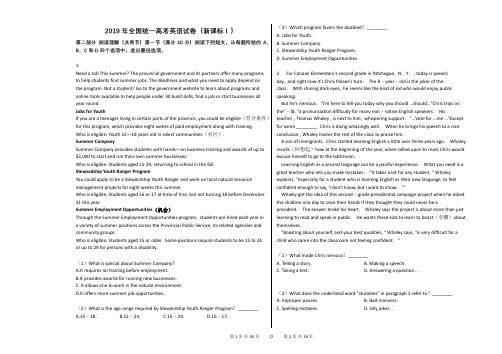
2019年全国统一高考英语试卷(新课标Ⅰ)第二部分阅读理解(共两节)第一节(满分30分)阅读下列短文,从每题所给的A、B、C和D四个选项中,选出最佳选项。
1.Need a Job This Summer? The provincial government and its partners offer many programsto help students find summer jobs. The deadlines and what you need to apply depend onthe program. Not a student? Go to the government website to learn about programs and online tools available to help people under 30 build skills, find a job or start businesses all year round.Jobs for YouthIf you are a teenager living in certain parts of the province, you could be eligible(符合条件)for this program, which provides eight weeks of paid employment along with training.Who is eligible: Youth 15—18 years old in select communities(社区).Summer CompanySummer Company provides students with hands—on business training and awards of up to $3,000 to start and run their own summer businesses.Who is eligible: Students aged 15-29, returning to school in the fall.Stewardship Youth Ranger ProgramYou could apply to be a Stewardship Youth Ranger and work on local natural resource management projects for eight weeks this summer.Who is eligible: Students aged 16 or 17 at time of hire, but not turning 18 before December 31 this year.Summer Employment Opportunities(机会)Through the Summer Employment Opportunities program, students are hired each year ina variety of summer positions across the Provincial Public Service, its related agencies and community groups.Who is eligible: Students aged 15 or older. Some positions require students to be 15 to 24or up to 29 for persons with a disability.(1)What is special about Summer Company?A.It requires no training before employment.B.It provides awards for running new businesses.C. It allows one to work in the natural environment.D.It offers more summer job opportunities.(2)What is the age range required by Stewardship Youth Ranger Program?________A.15﹣18.B.15﹣24.C.15﹣29.D.16﹣17.(3)Which program favors the disabled?________A. Jobs for Youth.B. Summer Company.C. Stewardship Youth Ranger Program.D. Summer Employment Opportunities.2. For Canaan Elementary's second grade in Patchogue, N.Y., today is speechday , and right now it's Chris Palaez's turn. The 8﹣year﹣old is the joker of the class. With shining dark eyes, he seems like the kind of kid who would enjoy public speaking.But he's nervous."I'm here to tell you today why you should …should…"Chris trips on the"﹣ld, "a pronunciation difficulty for many non﹣native English speakers. His teacher , Thomas Whaley , is next to him, whispering support."…Vote for …me …"Except for some ________, Chris is doing amazingly well. When he brings his speech to a nice conclusion , Whaley invites the rest of the class to praise him.A son of immigrants, Chris started learning English a little over three years ago. Whaley recalls(回想起)how at the beginning of the year, when called upon to read, Chris would excuse himself to go to the bathroom.Learning English as a second language can be a painful experience. What you need is a great teacher who lets you make mistakes. "It takes a lot for any student, " Whaley explains, "especially for a student who is learning English as their new language, to feel confident enough to say, 'I don't know, but I want to know.'"Whaley got the idea of this second﹣grade presidential campaign project when he asked the children one day to raise their hands if they thought they could never be a president. The answer broke his heart. Whaley says the project is about more than just learning to read and speak in public. He wants these kids to learn to boast(夸耀)about themselves."Boasting about yourself, and your best qualities, " Whaley says, "is very difficult for a child who came into the classroom not feeling confident."(1)What made Chris nervous?________A. Telling a story.B. Making a speech.C. Taking a test.D. Answering a question..(2)What does the underlined word "stumbles" in paragraph 2 refer to?________A. Improper pauses.B. Bad manners.C. Spelling mistakes.D. Silly jokes..(3)We can infer that the purpose of Whaley's project is to________.A. help students see their own strengthsB. assess students' public speaking skillsC. prepare students for their future jobsD. inspire students' love for politics.(4)Which of the following best describes Whaley as a teacher?________A. Humorous.B. Ambitious.C. Caring.D. Demanding.3.As data and identity theft becomes more and more common, the market is growing for biometric(生物测量)technologies—like fingerprint scans—to keep others out of private e-spaces. At present, these technologies are still expensive, though.Researchers from Georgia Tech say that they have come up with a low-cost device(装置)that gets around this problem: a smart keyboard. This smart keyboard precisely measures the cadence(节奏)with which one types and the pressure fingers apply to each key. The keyboard could offer a strong layer of security by analyzing things like the force of a user's typing and the time between key presses. These patterns are unique to each person. Thus, the keyboard can determine people's identities, and by extension, whether they should be given access to the computer it's connected to—regardless of whether someone gets the password right.It also doesn't require a new type of technology that people aren't already familiarwith. Everybody uses a keyboard and everybody types differently.In a study describing the technology, the researchers had 100 volunteers type the word "touch" four times using the smart keyboard. Data collected from the device could be used to recognize different participants based on how they typed, with very low error rates. The researchers say that the keyboard should be pretty straightforward to commercialize and is mostly made of inexpensive, plastic-like parts. The team hopes to make it to market in the near future.(1)Why do the researchers develop the smart keyboard?A.To reduce pressure on keys.B.To improve accuracy in typing.C.To replace the password system.D.To cut the cost of e-space protection.(2)What makes the invention of the smart keyboard possible?puters are much easier to operate.B.Fingerprint scanning techniques develop fast.C.Typing patterns vary from person to person.D.Data security measures are guaranteed.(3)What do the researchers expect of the smart keyboard?A.It'll be environment-friendly.B.It'll reach consumers soon.C.It'll be made of plastics.D.It'll help speed up typing.(4)Where is this text most likely from?A.A diary.B.A guidebook.C.A novel.D.A magazine.4. During the rosy years of elementary school(小学), I enjoyed sharing my dolls and jokes, which allowed me to keep my high social status. I was the queen of the playground. Then came my tweens and teens, and mean girls and cool kids. They rose in the ranks not by being friendly but by smoking cigarettes, breaking rules and playing jokes on others, among whom I soon found myself.Popularity is a well﹣explored subject in social psychology. Mitch Prinstein, a professor of clinical psychology sorts the popular into two categories: the likable and the status seekers. The likables' plays﹣well﹣with﹣others qualities strengthen schoolyard friendships, jump﹣start interpersonal skills and, when tapped early, are employed ever after in life and work. Then there's the kind of popularity that appears in adolescence: status born of power and even dishonorable behavior.Enviable as the cool kids may have seemed, Dr. Prinstein's studies show unpleasant consequences. Those who were highest in status in high school, as well as those least liked in elementary school, are "most likely to engage(从事)in dangerous and risky behavior."In one study, Dr. Prinstein examined the two types of popularity in 235 adolescents, scoring the least liked, the most liked and the highest in status based on student surveys(调查研究). "We found that the least well﹣liked teens had become more aggressive over time toward their classmates. But so had those who were high in status. It clearly showed that while likability can lead to healthy adjustment, high status has just the opposite effect on us."Dr. Prinstein has also found that the qualities that made the neighbors want you on a play date﹣sharing, kindness, openness ﹣ carry over to later years and make you better able to relate and connect with others.In analyzing his and other research, Dr. Prinstein came to another conclusion: Not only is likability related to positive life outcomes, but it is also responsible for those outcomes, too. "Being liked creates opportunities for learning and for new kinds of life experiences that help somebody gain an advantage, " he said.(1)What sort of girl was the author in her early years of elementary school?________A. Unkind.B. Lonely.C. Generous.D. Cool..(2)What is the second paragraph mainly about?________A. The classification of the popular.B. The characteristics of adolescents.C. The importance of interpersonal skills.D. The causes of dishonorable behavior..(3)What did Dr. Prinstein's study find about the most liked kids?________A. They appeared to be aggressive.B. They tended to be more adaptable.C. They enjoyed the highest status.D. They performed well academically..(4)What is the best title for the text?________A. Be Nice﹣You Won't Finish LastB. The Higher the Status, the BetterC. Be the Best﹣You Can Make ItD. More Self﹣Control, Less Aggressiveness.第二节(满分10分)根据短文内容,从短文后的选项中选出能填入空白处的最佳选项.选项中有两项为多余选项.5.Is Fresh Air Really Good for You?We all grew up hearing people tell us to "go out and get some fresh air." (1)_______ According to recent studies,the answer is a big YES,if the air quality in your camping area is good.(2)_______ If the air you're breathing is clean﹣which it would be if you're away from the smog of cities﹣then the air is filled with life﹣giving,energizing oxygen. If you exercise out of doors,your body will learn to breathe more deeply,allowing even more oxygen to get to your muscles(肌肉)and your brain.Recently,people have begun studying the connection between the natural world and healing(治愈).(3)_______ In these places patients can go to be near nature during their recovery. It turns out that just looking at green,growing things can reduce stress,lower blood pressure,and put people into a better mood(情绪).Greenery is good for us. Hospital patients Who see tree branches out their window are likely to recover at a faster rate than patients who see buildings or sky instead.(4)_______ It gives us a great feeling of peace.(5)_______While the sun's rays can age and harm our skin, they also give is beneficial Vitamin D. To make sure you get enough Vitamin D﹣but still protect your skin﹣ put on sunscreen right as you head outside. It takes sunscreen about fifteen minutes to start working, and that's plenty of time for your skin to absorb a day's worth of Vitamin D.A. Fresh air cleans our lungs.B. So what are you waiting for?C. Being in nature refreshes us.D. Another side benefit of getting fresh air is sunlight.E. But is fresh air really as good for you as your mother always said?F. Just as importantly, we tend to associate air with health care.G. All across the country, recovery centers have begun building Healing Gardens.第三部分语言知识运用(共两节)第一节(每小题1.5分,满分30分)阅读下面短文,从短文后各题所给的A、B、C和D四个选项中,选出可以填入空白处的最佳选项.6. Every year about 40, 000 people attempt to climb Kilimanjaro, the highest mountain in Africa. They(1)_______ with them lots of waste. The (2)_______ might damage the beauty of the place. The glaciers(冰川)are disappearing, changing the(3)_______of Kilimanjaro.Hearing these stories, I'm (4)_______ about the place ﹣ other destinations are described as "purer" natural experiences.However, I soon (5)_______ that much has changed since the days of disturbing reports of(6)_______ among tons of rubbish. I find a(7)_______ mountain, with toilets at camps and along the paths. The environmental challenges are(8)_______but the efforts made by the Tanzania National Park Authority seem to be (9)_______.The best of a Kilimanjaro (10)_______, in my opinion, isn't reaching thetop. Mountains are(11)_______as spiritual places by many cultures. This(12)_______is especially evident on Kilimanjaro as(13)_______go through five ecosystems (生态系统)in the space of a few kilometers. At the base is a rainforest. It ends abruptly at 3, 000 meters, (14)_______lands of low growing plants. Further up, the weather(15)_______ ﹣ low clouds envelope the mountainsides, which are covered with thick grass. I(16)_______twelve shades of green from where I stand. Above 4, 000 meters is the highland(17)_______: gravel(砾石), stones and rocks.(18)_______you climb into an arctic﹣like zone with(19)_______snow and the glaciers that may soon disappear.Does Kilimanjaro (20)_______ its reputation as a crowded mountain with lines of tourists ruining the atmosphere of peace? I found the opposite to be true.(1)A.keepB.mixC.connectD.bring(2)A.storiesB.buildingsC.crowdsD.reporters(3)A.positionB.ageC.face(4)A.silentB.skepticalC.seriousD.crazy(5)A.discoverB.argueC.decideD.advocate(6)A.equipmentB.grassC.campsD.stones(7)A.remoteB.quietC.allD.clean(8)A.newB.specialC.significantD.necessary(9)A.paying offB.spreading outC.blowing upD.fading away(10)A.atmosphereB.experienceC.experimentD.sight(11)A.studiedB.observedC.exploredD.regarded(12)A.viewB.qualityC.reasonD.purpose(13)A.scientistsB.climbersC.localsD.officials(14)A.holding on toB.going back toC.living up toD.giving way to(15)A.changesB.clearsC.improvesD.permits (16)A.matchB.imagineC.countD.add(17)A.villageB.desertC.roadke(18)A.ObviouslyB.EasilyC.ConsequentlyD.Finally(19)A.permanentB.littleC.freshD.artificial(20)A.enjoyB.deserveC.saveD.acquire第二节(每小题1.5分,满分15分)阅读下面材料,在空白处填入1个适当的单词或括号内单词的正确形式。
2019高考英语全国Ⅰ卷语法填空题精细解析

2019高考英语全国Ⅰ卷语法填空题精细解析黑龙江绥化一中高云峰第二节(共10小题;每小题1.5分,满分15分)阅读下面短文,在空白处填入1个适当的单词或括号内单词的正确形式The polar bear is found in the Arctic Circle and some big land masses as far south as Newfoundland. While they are rare north of 88, there is evidence 61 they range all the way across the Arctic, and as far south as James Bay in Canada. It is difficult to figure out a global population of polar bears as much of the range has been 62 (poor) studied;however, biologists calculate that there are about 20,000-25,000 polar bears worldwide.Modern methods 63 tracking polar bear populations have been employed only since the mid-1980s, and are expensive 64 (perform) consistently over a large area. In recent years some Inuit people in Nunavut 65 (report) increases in bear sightings around human settlements, leading to a 66 (believe) that populations are increasing. Scientists have responded by 67 (note) that hungry bears may be congregating (聚集) around human settlements, leading to the illusion( 错觉) that populations are 68 (high) than they actually are. Of 69 nineteen recognized polar bear accumulation, three are declining, six 70 (be) stable, one is increasing, and nine lack enough data.【61题】句子连接关系题→同位语从句题。
2019年高考全国Ⅰ卷英语真题(含答案)
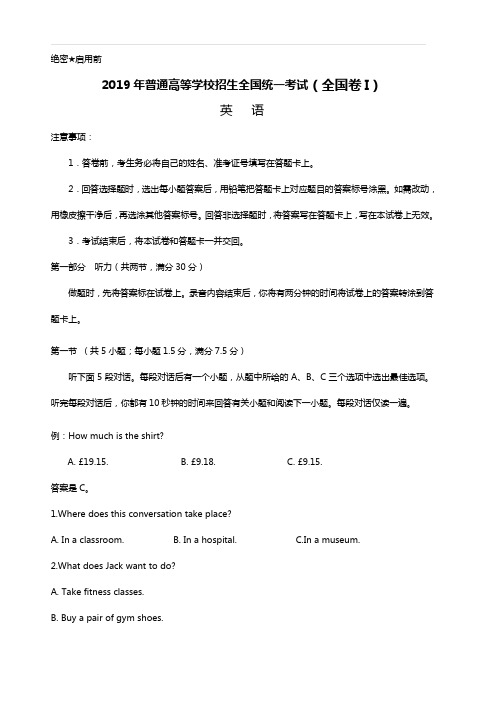
绝密★启用前2019年普通高等学校招生全国统一考试(全国卷I)英语注意事项:1.答卷前,考生务必将自己的姓名、准考证号填写在答题卡上。
2.回答选择题时,选出每小题答案后,用铅笔把答题卡上对应题目的答案标号涂黑。
如需改动,用橡皮擦干净后,再选涂其他答案标号。
回答非选择题时,将答案写在答题卡上,写在本试卷上无效。
3.考试结束后,将本试卷和答题卡一并交回。
第一部分听力(共两节,满分30分)做题时,先将答案标在试卷上。
录音内容结束后,你将有两分钟的时间将试卷上的答案转涂到答题卡上。
第一节(共5小题;每小题1.5分,满分7.5分)听下面5段对话。
每段对话后有一个小题,从题中所给的A、B、C三个选项中选出最佳选项。
听完每段对话后,你都有10秒钟的时间来回答有关小题和阅读下一小题。
每段对话仅读一遍。
例:How much is the shirt?A. £19.15.B. £9.18.C. £9.15.答案是C。
1.Where does this conversation take place?A. In a classroom.B. In a hospital.C.In a museum.2.What does Jack want to do?A. Take fitness classes.B. Buy a pair of gym shoes.C. Change his work schedule.3.What are the speakers talking about?A. What to drink.B. Where to meet.C. When to leave.4.What is the relationship between the speakers?A. Colleges.B. Classmates.C. Strangers.5.Why is Emily mentioned in the conversation?A. She might want a ticket.B. She is looking for the man.C. She has an extra ticket.第二节(共15小题,每小题1.5分,满分22.5分)听下面5段对话或独白。
2019年高考英语试卷听力+原文+答案(新课标2卷、3卷)
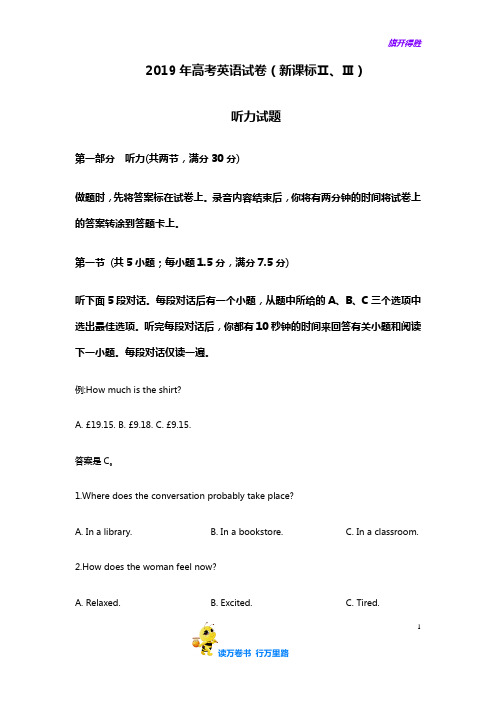
2019年高考英语试卷(新课标Ⅱ、Ⅲ)听力试题第一部分听力(共两节,满分30分)做题时,先将答案标在试卷上。
录音内容结束后,你将有两分钟的时间将试卷上的答案转涂到答题卡上。
第一节(共5小题;每小题1.5分,满分7.5分)听下面5段对话。
每段对话后有一个小题,从题中所给的A、B、C三个选项中选出最佳选项。
听完每段对话后,你都有10秒钟的时间来回答有关小题和阅读下一小题。
每段对话仅读一遍。
例:How much is the shirt?A. £19.15.B. £9.18.C. £9.15.答案是C。
1.Where does the conversation probably take place?A. In a library.B. In a bookstore.C. In a classroom.2.How does the woman feel now?A. Relaxed.B. Excited.C. Tired.13.How much will the man pay?A. $520.B. $80.C. $100.4.What does the man tell Jane to do?A. Postpone his appointment.B. Meet Mr. Douglas.C. Return at 3 o’clock.5.Why would David quit his job?A. T o go back to school.B. To start his own firm.C. T o work for his friend.第二节(共15小题;每小题1.5分,满分22.5分)听下面5段对话或独白。
每段对话或独白后有几个小题,从题中所给的A、B、C三个选项中选出最佳选项。
听每段对话或独白前,你将有时间阅读各个小题,每小题5秒钟;听完后,各小题将给出5秒钟的作答时间。
2019年高考英语全国卷1试题卷(全国卷I含答案和解析)
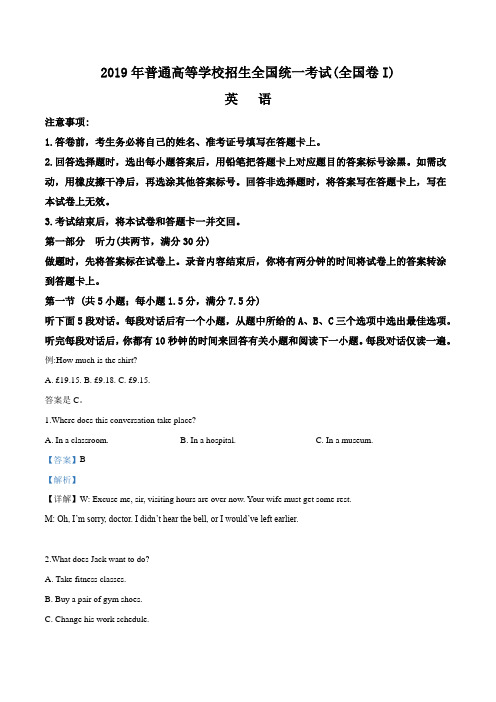
2019年普通高等学校招生全国统一考试(全国卷I)英语注意事项:1.答卷前,考生务必将自己的姓名、准考证号填写在答题卡上。
2.回答选择题时,选出每小题答案后,用铅笔把答题卡上对应题目的答案标号涂黑。
如需改动,用橡皮擦干净后,再选涂其他答案标号。
回答非选择题时,将答案写在答题卡上,写在本试卷上无效。
3.考试结束后,将本试卷和答题卡一并交回。
第一部分听力(共两节,满分30分)做题时,先将答案标在试卷上。
录音内容结束后,你将有两分钟的时间将试卷上的答案转涂到答题卡上。
第一节 (共5小题;每小题1.5分,满分7.5分)听下面5段对话。
每段对话后有一个小题,从题中所给的A、B、C三个选项中选出最佳选项。
听完每段对话后,你都有10秒钟的时间来回答有关小题和阅读下一小题。
每段对话仅读一遍。
例:How much is the shirt?A. £19.15.B. £9.18.C. £9.15.答案是C。
1.Where does this conversation take place?A. In a classroom.B. In a hospital.C. In a museum.【答案】B【解析】【详解】W: Excuse me, sir, visiting hours are over now. Your wife must get some rest.M: Oh, I’m sorry, doctor. I didn’t hear the bell, or I would’ve left earlier.2.What does Jack want to do?A. Take fitness classes.B. Buy a pair of gym shoes.C. Change his work schedule.【答案】A【解析】【详解】M: Hello, my name is Jack. I need to get in shape. How do I register for the classes?W: We’ll need you to join the gym, and then you can find out which classes fit your schedule the best.3.What are the speakers talking about?A. What to drink.B. Where to meet.C. When to leave. 【答案】B 【解析】【详解】W: I’ll see you at the theatre.M: Better still, let’s meet in the Red Lion bar to have a little nice talk.W: Good idea, and I’d love to have a drink there.4.What is the relationship between the speakers? A. Colleges. B. Classmates. C. Strangers. 【答案】C 【解析】【详解】M: Hello, my name is John Arber. And I’m calling to ask about the position advertised in Friday’sDailyMail.W: Yes, the position is still open. You could come over and have a talk with us.5.Why is Emily mentioned in the conversation?A. She might want a ticket.B. She is looking for the man.C. She has an extra ticket【答案】A【解析】【详解】M: I have an extra ticket to the concert tonight. Would you like to join me?W: Thanks, but I already have one. You can ask Emily. She might be interested.第二节(共15小题,每小题1.5分,满分22.5分)听下面5段对话或独白。
2019年黑龙江省高考英语试题与答案(word版)
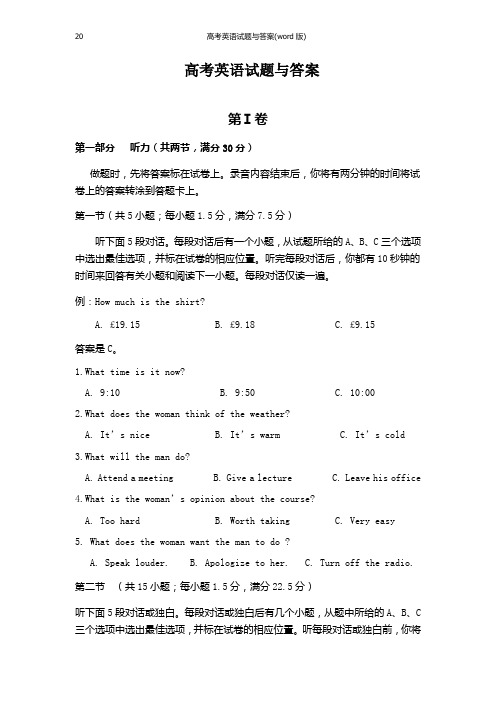
高考英语试题与答案第Ⅰ卷第一部分听力(共两节,满分30分)做题时,先将答案标在试卷上。
录音内容结束后,你将有两分钟的时间将试卷上的答案转涂到答题卡上。
第一节(共5小题;每小题1.5分,满分7.5分)听下面5段对话。
每段对话后有一个小题,从试题所给的A、B、C三个选项中选出最佳选项,并标在试卷的相应位置。
听完每段对话后,你都有10秒钟的时间来回答有关小题和阅读下一小题。
每段对话仅读一遍。
例:How much is the shirt?A. £19.15B. £9.18C. £9.15答案是C。
1.What time is it now?A. 9:10B. 9:50C. 10:002.What does the woman think of the weather?A. It’s niceB. It’s warmC. It’s cold3.What will the man do?A. Attend a meetingB. Give a lectureC. Leave his office4.What is the woman’s opinion about the course?A. Too hardB. Worth takingC. Very easy5. What does the woman want the man to do ?A. Speak louder.B. Apologize to her.C. Turn off the radio.第二节(共15小题;每小题1.5分,满分22.5分)听下面5段对话或独白。
每段对话或独白后有几个小题,从题中所给的A、B、C 三个选项中选出最佳选项,并标在试卷的相应位置。
听每段对话或独白前,你将有时间阅读各个小题,每小题5秒钟;听完后,各小题将给出5秒钟的作答时间。
每段对话或独白读两遍。
听第6段材料,回答第6、7题。
6. How long did Michael stay in China?A. Five days.B. One week.C.Two weels.7. Where did Michael go last year?A. Russia.B. Norway.C. India.听第7段材料,回答第8、9题8.Whet food does Sally like?A.Cook dinner.B.Fish.C.Eggs.9.What are the speakers going to do?A.Cook dinner.B.Go shopping.C.Order dishes.听第8段材料,回答第10至12题.10.Where are the speakers?A.In a hospital.B.In the office.C.At home.11.When is the report due ?A.Thursday.B.Friday.C.Next Monday.12.What does George suggest Stephanie do with the report?A.Improve it.B.Hand it in later.C.Leave it with him.听第9段材料,回答第13至16题。
黑龙江省2019年高考真题(全国卷II)英语试题(解析版)

绝密★启用前黑龙江省2019年普通高等学校招生全国统一考试(全国卷II)英语试题(解析版)注意事项:1.答卷前,考生务必将自己的姓名、准考证号填写在答题卡上。
2.回答选择题时,选出每小题答案后,用铅笔把答题卡上对应题目的答案标号涂黑。
如需改动,用橡皮擦干净后,再选涂其他答案标号。
回答非选择题时,将答案写在答题卡上,写在本试卷上无效。
3.考试结束后,将本试卷和答题卡一并交回。
第一部分听力(共两节,满分30分)做题时,先将答案标在试卷上。
录音内容结束后,你将有两分钟的时间将试卷上的答案转涂到答题卡上。
第一节 (共5小题;每小题1.5分,满分7.5分)听下面5段对话。
每段对话后有一个小题,从题中所给的A、B、C三个选项中选出最佳选项。
听完每段对话后,你都有10秒钟的时间来回答有关小题和阅读下一小题。
每段对话仅读一遍。
例:How much is the shirt?A. £19.15.B. £9.18.C. £9.15.答案是C。
1.Where does the conversation probably take place?A. In a library.B. In a bookstore.C. In a classroom.【答案】B【解析】【详解】此为听力题,解析略。
2.How does the woman feel now?A. Relaxed.B. Excited.C. Tired.【答案】C【解析】【详解】此为听力题,解析略。
3.How much will the man pay?A. $520.B. $80.C. $100.【答案】B【解析】【详解】此为听力题,解析略。
4.What does the man tell Jane to do?A. Postpone his appointment.B. Meet Mr. Douglas.C. Return at 3 o’clock.【答案】A【解析】【详解】此为听力题,解析略。
- 1、下载文档前请自行甄别文档内容的完整性,平台不提供额外的编辑、内容补充、找答案等附加服务。
- 2、"仅部分预览"的文档,不可在线预览部分如存在完整性等问题,可反馈申请退款(可完整预览的文档不适用该条件!)。
- 3、如文档侵犯您的权益,请联系客服反馈,我们会尽快为您处理(人工客服工作时间:9:00-18:30)。
2019年黑龙江省高考英语试题与答案(满分150分,考试时间120分钟)注意事项:1.答卷前,考生务必将自己的姓名、准考证号填写在答题卡上。
2.回答选择题时,选出每小题答案后,用铅笔把答题卡上对应题目的答案标号涂黑。
如需改动,用橡皮擦干净后,再选涂其他答案标号。
回答非选择题时,将答案写在答题卡上,写在本试卷上无效。
3.考试结束后,将本试卷和答题卡一并交回。
第一部分听力(共两节,满分30分)做题时,先将答案标在试卷上。
录音内容结束后,你将有两分钟的时间将试卷上的答案转涂到答题卡上。
第一节(共5小题;每小题1.5分,满分7.5分)听下面5段对话。
每段对话后有一个小题,从题中所给的A、B、C三个选项中选出最佳选项。
听完每段对话后,你都有10秒钟的时间来回答有关小题和阅读下一小题。
每段对话仅读一遍。
例:How much is the shirt?A. £19.15.B. £9.18.C. £9.15.答案是C。
1. Where does the conversation probably take place?A. In a library.B. In a bookstore.C. In a classroom.2. How does the woman feel now?A. Relaxed.B. Excited.C. Tired.3. How much will the man pay?A. $520.B. $80.C. $100.4. What does the man tell Jane to do?A. Postpone his appointment.B. Meet Mr. Douglas.C. Return at 3 o’clock.5. Why would David quit his job?A. To go back to school.B. To start his own firm.C. To work for his friend.第二节(共15小题;每小题1.5分,满分22.5分)听下面5段对话或独白。
每段对话或独白后有几个小题,从题中所给的A、B、C三个选项中选出最佳选项。
听每段对话或独白前,你将有时间阅读各个小题,每小题5秒钟;听完后,各小题将给出5秒钟的作答时间。
每段对话或独白读两遍。
听第6段材料,回答第6、7题。
6. What does the man want the woman to do?A. Check the cupboard.B. Clean the balcony.C. Buy an umbrella.7. What is the probable relationship between the speakers?A. Husband and wife.B. Employer and employee.C. Shop assistant and customer.听第7段材料,回答第8至10题。
8. Where did the woman go at the weekend?A. The city centre.B. The forest park.C. The man’s home.9. How did the man spend his weekend?A. Packing for a move.B. Going out with Jenny.C. Looking for a new house.10. What will the woman do for the man?A. Take Henry to hospital.B. Stay with his kid.C. Look after his pet.听第8段材料,回答第11至13题。
11. What is Mr. Stone doing now?A. Eating lunch.B. Having a meeting.C. Writing a diary.12. Why does the man want to see Mr. Stone?A. To discuss a program.B. To make a travel plan.C. To ask for sick leave.13. When will the man meet Mr. Stone this afternoon?A. At 3:00.B. At 3:30.C. At 3:45.听第9段材料,回答第14至16题。
14. What are the speakers talking about?A. A company.B. An interview.C. A job offer.15. Who is Monica Stansfield?A. A junior specialist.B. A department manager.C. A sales assistant.16. When will the man hear from the woman?A. On Tuesday.B. On Wednesday.C. On Thursday.听第10段材料,回答第17至20题。
17. What did John enjoy doing in his childhood?A. Touring France.B. Playing outdoors.C. Painting pictures.18. What did John do after he moved to the US?A. He did business.B. He studied biology.C. He worked on a farm.19. Why did John go hunting?A. For food.B. For pleasure.C. For money.20. What is the subject of John’s works?A. American birds.B. Natural scenery.C. Family life.第二部分阅读理解(共两节,满分40分)第一节(共15小题;每小题2分,满分30分)阅读下列短文,从每题所给的A、B、C和D四个选项中,选出最佳选项。
AMy Favourite BooksJo Usmar is a writer for Cosmopolitan and co-author of the This Book Will series(系列)of lifestyle books. Here she picks her top reads.MatildaRoald DahlI once wrote a paper on the influence of fairy tales on Roald Dahl's writing and it gave me a new appreciation for his strange and delightful words. Matilda's battles with her cruel me parents and the bossy headmisres,Miss Trunchbull,are equally fumy and frightening,but they're also aspirational.After DarkHaruki MurakamiIt’s about two sisters-Eri,a model who either won’t or can’t stop sleeping,and Mari, a young student . In trying to connect to her sister. Mari starts changing her life and discovers a world of diverse ”night people” who are hiding secrets.Gone GirlGillian FynnThere was a bit of me that didn't want to love this when everyone else on the planet did but the horror story is brilliant. There's tension and anxiety from the beginning as Nick and Amy battle for your trust. It's a real whodunit and the frustration when you realise what's going on is horribly enjoyableThe StandStephen KingThis is an excellent fantasy novel from one of the best storytellers around. After a serious flu outbreak wipes out 99.4% of the world's population, a battle unfolds between good and evil among those let. Randall Flagg is one of the scariest characters ever.21. Who does "I" refer to in the text?A. Stephen King.B. Gillian Flynn.bC. Jo Usmar.D. Roald Dahl22. Which of the following tells about Mari and Eri?A. Cosmopolitan.B. Matilda.C. After Dark.D. The Stand.23. What kind of book is G one Girl?)A.A folk tale.B.A biography.C.A love story.D.A horror story.B“You can use me as a last resort(选择), and if nobody else volunteers,then I will do it.” This was an actual reply from a parent after I put out a request for volunteers for my kids lacrosse(长曲棍球)club.I guess that there's probably some demanding work schedule, or social anxiety around stepping up to help for an unknown sport. She may just need a little persuading. So I try again and tug at the heartstrings. I mention the single parent with four kids running the show and I talk about the dad coaching a team that his kids aren’t even on … At this point the unwilling parent speaks up,“Alright. Yes, I’ll do it.”I’m secretly relieved because I know there’s real power in sharing volunteer responsibilities among many. The unwilling parent organizes the meal schedule, sends out emails, and collects money for end-of-season gifts. Somewhere along the way, the same parent ends up becoming an invaluable member of the team. The coach is able to focus on the kids while the other parents are relieved to be off the hook for another season. Handing out sliced oranges to bloodthirsty kids can be as exciting as watching your own kid score a goal.Still, most of us volunteers breathe a sigh of relief when the season comes to a close. That relief is coupled with a deep understanding of why the same people keep coming back for more: Connecting to thecommunity(社区)as you freely give your time, money, skills, or services provides a real joy. Volunteering just feels so good.In that sense, I’m pretty sure volunteering is more of a selfish act than I’d freely like to admit. However, if others benefit in the process, and I get some reward too, does it really matter where my motivation lies?24.What can we infer about the parent from her reply in paragraph l?A. She knows little about the club.B. She isn't good at sports.C. She just doesn't want to volunteer.D. She's unable to meet her schedule.25.What does the underlined phrase“tug at the heartstrings”in paragraph 2 mean ?A. Encourage team work .B. Appeal to feeling.C. Promote good deeds.D. Provide advice.26. What can we learn about the parent from paragraph 3 ?A. She gets interested in lacrosse.B. She is proud of her kids.C. She’ll work for another season.D. She becomes a good helper.27. Why does the author like doing volunteer work?A. It gives her a sense of duty.B. It makes her very happy.C. It enables her to work hard.D. It brings her material rewards.CMarian Bechtel sits at West Palm Beach’s Bar Louie counter by herself, quietly reading her e-book as she waits for her salad. What is she reading? None of your business! Lunch is Bechtel’s “me” time. And like more Americans, she’s not alone.A new report found 46 percent of meals are eaten alone in America. More than half(53 percent)have breakfast alone and nearly half(46 percent)have lunch by themselves. Only at dinnertime are we eating together anymore,74 percent,according to statistics from the report.“I prefer to go out and be out. Alone,but together,you know?”Bechtel said,looking up from her book. Bechtel,who works in downtown West Palm Beach,has lunch with coworkers sometimes,but like many of us,too often works through lunch at her desk. A lunchtime escape allows her to keep a boss from tapping her on the shoulder. She returns to work feeling energized. “Today,I just wanted some time to myself,”she said.just two seats over,Andrew Mazoleny,a local videographer,is finishing his lunch at the bar. He likesthat he can sit and check his phone in peace or chat up the barkeeper with whom he's on a first-name basis if he wants to have a little interaction(交流). “I reflect on how my day's gone and think about the rest of the week,” he said. “It's a chance for self-reflection, You return to work recharged and with a plan.”That freedom to choose is one reason more people like to eat alone. There was a time when people may have felt awkward about asking for a table for one,but those days are over. Now,we have our smartphones to keep us company at the table. “It doesn't feel as alone as it may have before al the advances in technology,” said Laurie Demerit,whose company provided the statistics for the report.28. What are the statistics in paragraph 2 about?A. Food variety.B. Eating habits.C. Table manners.D. Restaurant service.29. Why does Bechtel prefer to go out for lunch?A. To meet with her coworkers.B. To catch up with her work.C. To have some time on her own.D. To collect data for her report.30. What do we know about Mazoleny?A. He makes videos for the bar.B. He’s fond of the food at the bar.C. He interviews customers at the bar.D. He’s familiar with the barke eper.31. What is the text mainly about?A. The trend of having meals alone.B. The importance of self-reflection.C. The stress from working overtime.D. The advantage of wireless technology.DBacteria are an annoying problem for astronauts. The microorganisms(微生物)from our bodies grow uncontrollably on surfaces of the International Space Station, so astronauts spend hours cleaning them up each week. How is NASA overcoming this very tiny big problem? It’s turning to a bunch of high school kids. But not just any kids. It depending on NASA HUNCH high school class, like the one science teachers Gene Gordon and Donna Himmelberg lead at Fairport High School in Fairport, New York.HUNCH is designed to connect high school classrooms with NASA engineers. For the past two years, Gordon’s students have been studying ways to kill bacteria in zero gravity, and they think they’re close to a solution(解决方案). “We don’t give the students any breaks. They have to do it just like NASA engineers,” says Florence Gold, a project manager.“There are no tests,” Gordon says. “There is no graded homework. There almost are no grades, other than‘Are you working towards your goal?’Basically, it’s ‘I’ve got to produce this product and then, atthe end of year, present it to NASA.’Engineers come and really do an in-person review, and…it’s not a very nice thing at time. It’s a hard business review of your product.”Gordon says the HUNCH program has an impact(影响)on college admissions and practical life skills. “These kids are so absorbed in their studies that I just sit back. I don’t teach.” And that annoying bacteria? Gordon says his students are emailing daily with NASA engineers about the problem, readying a workable solution to test in space.32.What do we know about the bacteria in the International Space Station?A. They are hard to get rid of.B. They lead to air pollution.C. They appear different forms.D. They damage the instruments.33. What is the purpose of the HUNCH program?A. To strengthen teacher-student relationships.B. To sharpen students’ communication skills.C. To allow students to experience zero gravity.D. To link space technology with school education34. What do the NASA engineers do for the students in the program?A. Check their product.B. Guide project designsC. Adjust work schedules.D. Grade their homework.35. What is the best title for the text?A. NASA: The Home of Astronauts.B. Space: The Final Homework Frontier.C. Nature: An Outdoor Classroom.D. HUNCH:A College Admission Reform.第二节(共5小题;每小题2分,满分10分)根据短文内容,从短文后的选项中选出能填入空白处的最佳选项。
